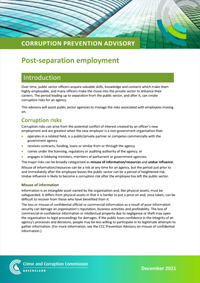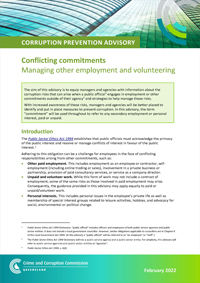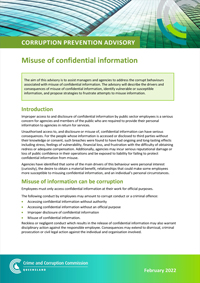Knowing where corruption is most likely to occur is fundamental to managing it effectively.
The following resources have been designed to assist Queensland public sector agencies identify major corruption risks and develop prevention strategies.
For more corruption prevention resources, see our Prevention in Focus series of publications and our corruption audit reports.
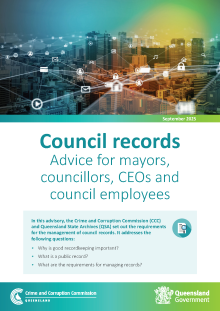
This joint corruption prevention advisory from the Crime and Corruption Commission and the Queensland State Archives, outlines the importance of recordkeeping for councils, defining public records and management requirements. It addresses the following questions:
- Why is good recordkeeping important?
- What is a public record?
- What are the requirements for managing records?
View Council records: Advice for mayors, councillors, CEOs and government employees – (September 2025)
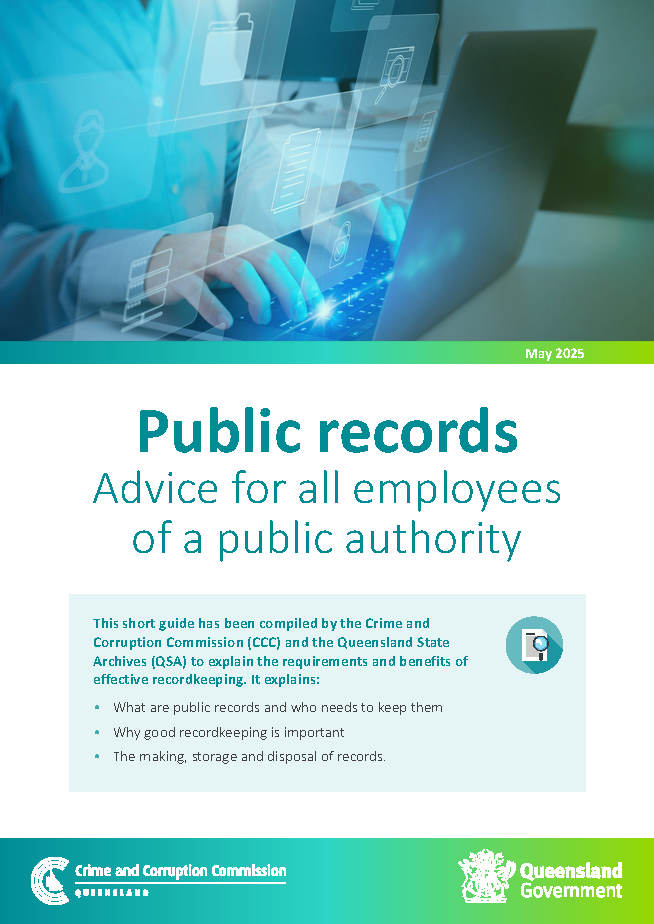
This joint corruption prevention advisory from the Crime and Corruption Commission and the Queensland State Archives, provides guidance on public records management for employees of public authorities in Queensland. This short guide explains:
- what a public record is and who should keep them
- why good recordkeeping is important; and how poor recordkeeping can put you and your agency at risk
- It also outlines the key elements to be considered when creating, storing and disposing of public records.
View Public records: Advice for all employees of a public authority – (May 2025)
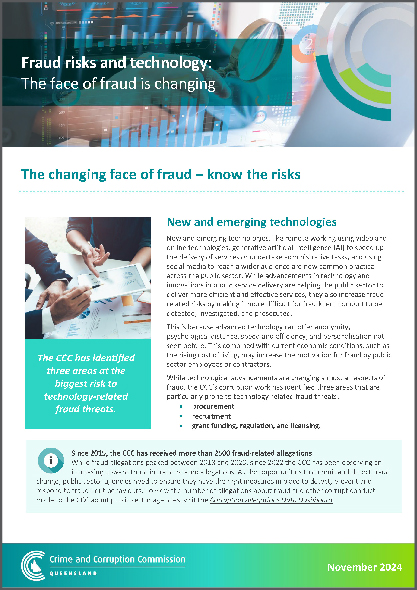
The face of fraud is changing. Global, national, and state agency collaboration is more important than ever to understand and address fraud.
Ongoing disruptions including new and emerging technologies, the growing prevalence of identity crime, the influence of social media and the digitisation of our government and economy are changing the face of fraud.
Download our latest factsheet Fraud risks and technology: The face of fraud is changing to learn about the three corruption risk areas particularly prone to technology-related fraud threats, and the ways public sector agencies can work together to detect, prevent, and respond to these risks.
View Fraud risks and technology: The face of fraud is changing — November 2024
This factsheet provides ad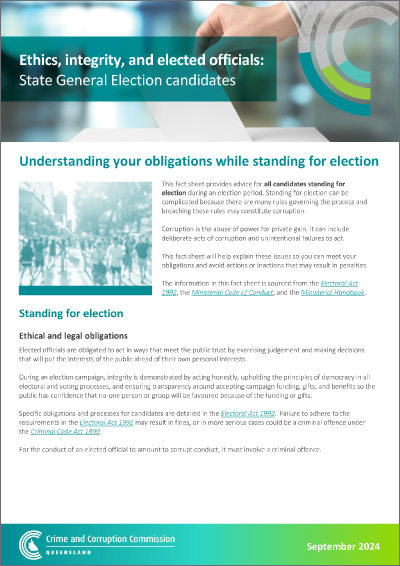 vice for all candidates standing for election during an election period. Standing for election can be complicated because there are many rules governing the process and breaching these rules may constitute corruption.
vice for all candidates standing for election during an election period. Standing for election can be complicated because there are many rules governing the process and breaching these rules may constitute corruption.
The information in this factsheet is sourced from the Electoral Act 1992, the Ministerial Code of Conduct, and the Ministerial Handbook.
View Ethics, integrity and elected officials: State General Election candidates — September 2024
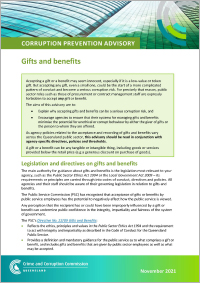
Accepting a gift or a benefit may seem innocent, especially if it is a low-value or token gift. But accepting any gift, even a small one, could be the start of a more complicated pattern of conduct and become a serious corruption risk. For precisely that reason, public sector roles such as those of procurement or contract management staff are expressly forbidden to accept any gift or benefit.
The aims of this advisory are to:
- Explain why accepting gifts and benefits can be a serious corruption risk, and
- Encourage agencies to ensure that their systems for managing gifts and benefits minimise the potential for unethical or corrupt behaviour by either the giver of gifts or the person to whom they are offered.
View Corruption Prevention Advisory: Gifts and benefits — December 2024
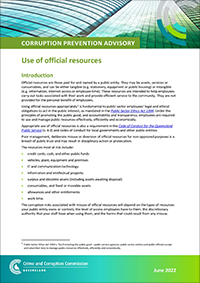
Official resources are those paid for and owned by a public entity. They may be assets, services or consumables, and can be either tangible (e.g. stationery, equipment or public housing) or intangible (e.g. information, internet access or employee time). These resources are intended to help employees carry out tasks associated with their work and provide efficient service to the community. They are not provided for the personal benefit of employees.
Poor management, deliberate misuse or diversion of official resources for non-approved purposes is a breach of public trust and may result in disciplinary action or prosecution.
The resources most at risk include:
- credit cards, cash, and other public funds
- vehicles, plant, equipment and premises, and
- IT and communication technology.
View Corruption Prevention Advisory: Use of official resources — December 2024
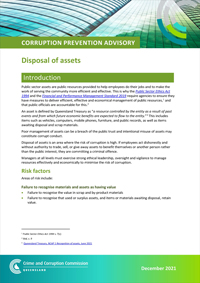 Disposal of assets is an area where the risk of corruption is high. If employees act dishonestly and without authority to trade, sell, or give away assets to benefit themselves or another person rather than the public interest, they are committing a criminal offence.
Disposal of assets is an area where the risk of corruption is high. If employees act dishonestly and without authority to trade, sell, or give away assets to benefit themselves or another person rather than the public interest, they are committing a criminal offence.
View Corruption Prevention Advisory: Disposal of assets — December 2024
Over time, public sector officers acquire valuable skills, knowledge and contacts which make them highly employable, and many officers make the move into the private sector to enhance their careers. The period leading up to separation from the public sector, and after it, can create corruption risks for an agency.
View Corruption Prevention Advisory: Post-separation employment — December 2024
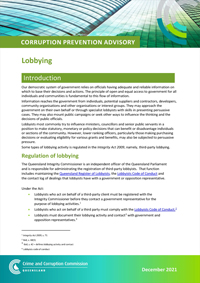
Lobbying and advocacy is fundamental to our democratic system of government and, when conducted ethically, can lead to better outcomes for the community. However, when lobbying is not conducted transparently and in accordance with relevant laws, lobbying can lead to corruption risks and the perception of it, including risks associated with improper influence of decision-makers, a lack of transparency in government decision-making and result in biased or partial decision-making and the misuse of public funds and resources.
View Corruption Prevention Advisory: Lobbying — December 2024
The aim of this advisory is to equip managers and supervisors with information about the corruption risks that can arise when public sector staff engage in employment or other commitments outside of their agency. The advisory describes the types of conflicts that may arise, signs that other commitments are impacting duties, the potential escalation into corrupt conduct, and strategies to manage risk.
With increased awareness of these risks, managers and supervisors will be better placed to identify and put in place measures to prevent corruption.
View Corruption Prevention Advisory: Conflicting commitments — February 2022
Improper access to and disclosure of confidential information by public sector employees is a serious concern for agencies and members of the public who are required to provide their personal information to agencies in return for services.
The aim of this advisory is to assist managers and agencies to address the corrupt behaviours associated with misuse of confidential information. The advisory will describe the drivers and consequences of misuse of confidential information, identify vulnerable or susceptible information, and propose strategies to frustrate attempts to misuse information.
View Corruption Prevention Advisory: Misuse of confidential information — February 2022
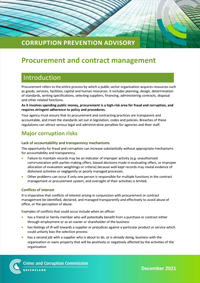 Procurement refers to the entire process by which a public sector organisation acquires resources such as goods, services, facilities, capital and human resources. It includes planning, design, determination of standards, writing specifications, selecting suppliers, financing, administering contracts, disposal and other related functions.
Procurement refers to the entire process by which a public sector organisation acquires resources such as goods, services, facilities, capital and human resources. It includes planning, design, determination of standards, writing specifications, selecting suppliers, financing, administering contracts, disposal and other related functions.
View Corruption Prevention Advisory: Procurement and contract management — December 2021
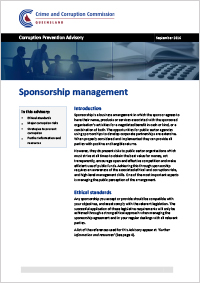 Sponsorship is a business arrangement in which the sponsor agrees to have their name, products or services associated with the sponsored organisation’s activities for a negotiated benefit in cash or kind, or a combination of both. The opportunities for public sector agencies using sponsorships to develop corporate partnerships are extensive.
Sponsorship is a business arrangement in which the sponsor agrees to have their name, products or services associated with the sponsored organisation’s activities for a negotiated benefit in cash or kind, or a combination of both. The opportunities for public sector agencies using sponsorships to develop corporate partnerships are extensive.
When properly considered and implemented they can provide all parties with positive and tangible returns.
However, they do present risks to public sector organisations which must strive at all times to obtain the best value for money, act transparently, encourage open and effective competition and make efficient use of public funds. Achieving this through sponsorship requires an awareness of the associated ethical and corruption risks, and high-level management skills. One of the most important aspects is managing the public perception of the arrangement.
View Corruption Prevention Advisory: Sponsorship Management — September 2016

